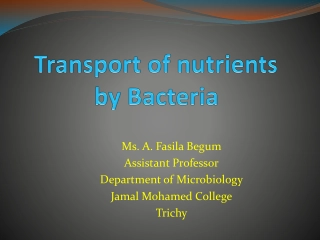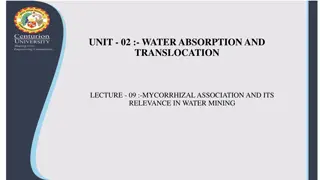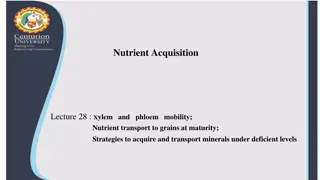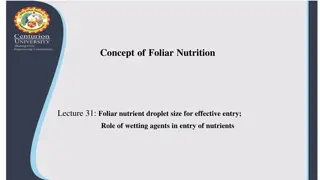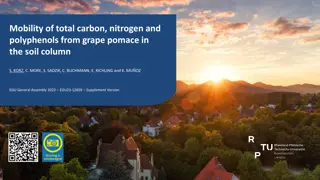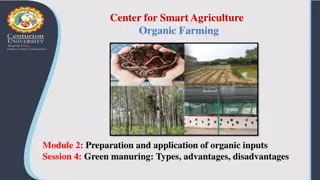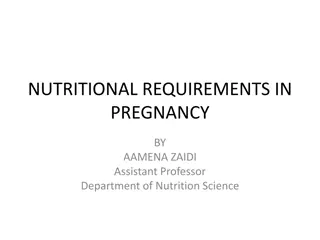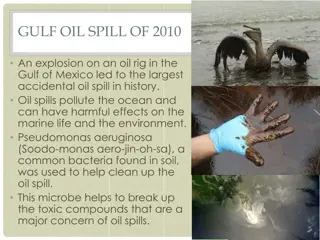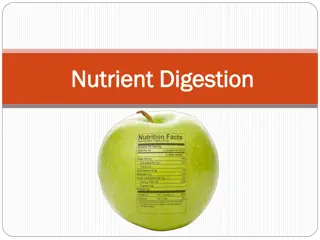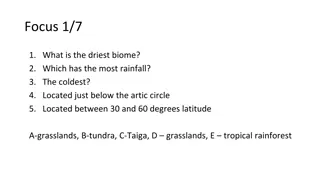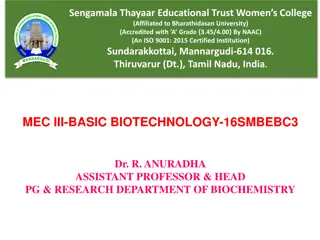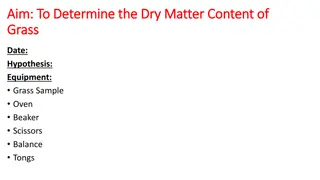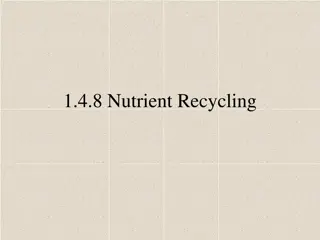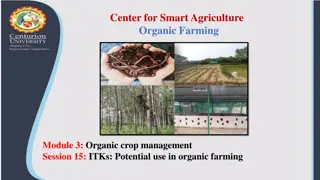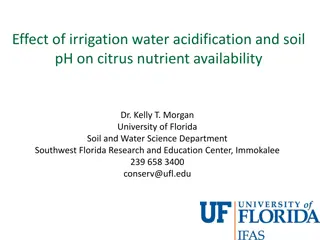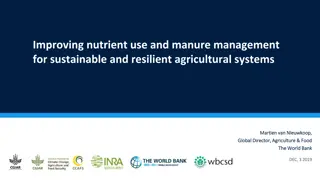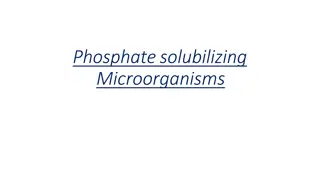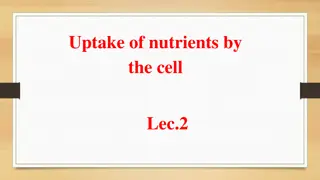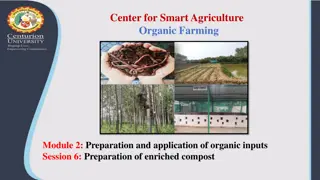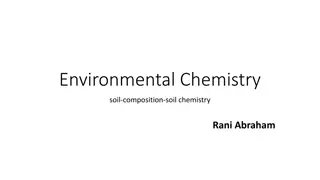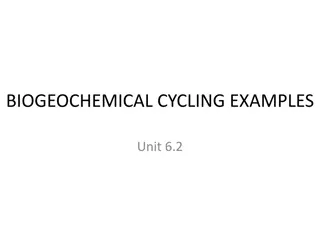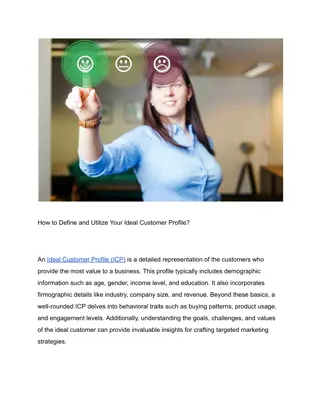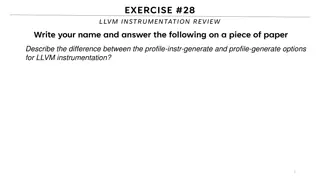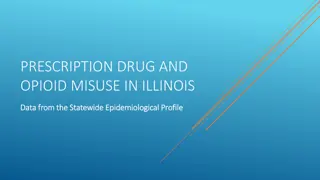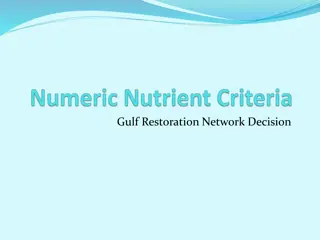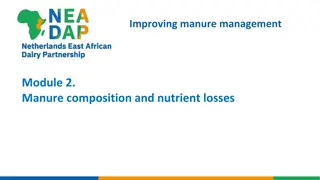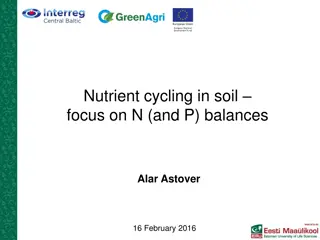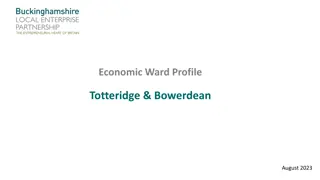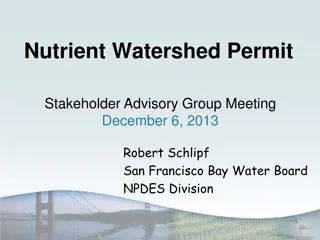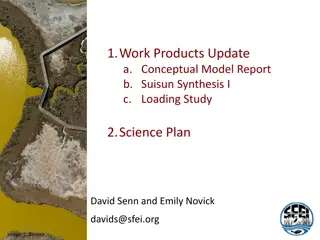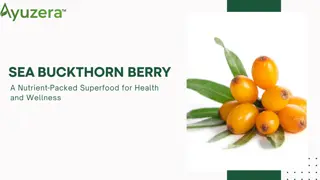Nutrient Uptake in Bacteria: Mechanisms and Factors
The process of nutrient uptake in bacteria, including the role of macronutrients, micronutrients, and environmental factors. Learn about the different mechanisms of nutrient transport and the importance of selective permeability in plasma membranes.
0 views • 25 slides
Mycorrhizal Association and Its Importance in Water Mining
Mycorrhizal association plays a crucial role in facilitating nutrient and water absorption for plants through a symbiotic relationship with fungi. This relationship enhances the plant's ability to acquire minerals from the soil while providing essential compounds to the fungi. The mycorrhizal associ
4 views • 6 slides
Nutrient Acquisition
Plants utilize xylem and phloem to transport water, nutrients, and minerals throughout their structures. Xylem moves water and mineral salts from roots to leaves, while phloem transports sugars and amino acids from leaves to the rest of the plant. Nutrient acquisition involves passive and active tra
2 views • 6 slides
Concept of Foliar Nutrition
Explore the crucial concepts of foliar nutrition, including the role of droplet size in nutrient entry and the importance of wetting agents in optimizing nutrient absorption in plants. Discover how smaller droplets enhance efficiency while avoiding drift, and how wetting agents facilitate water upta
0 views • 8 slides
Grape Pomace Utilization in Soil Nutrient Management Study
Study on the mobility of total carbon, nitrogen, and polyphenols from grape pomace in soil columns, focusing on its relevance as an organic fertilizer rich in nutrients. The research also highlights the industrial potential of grape pomace, nutrient mobility between varieties, and methods used for c
1 views • 14 slides
Understanding Green Manuring in Organic Farming: Types, Advantages, and Disadvantages
Green manuring involves incorporating green plant tissues into the soil to enhance fertility and structure. This method includes types like in-situ and green leaf manuring. Desirable qualities of a good green manuring crop are quick growth, nutrient fixation, and deep root systems. Advantages includ
0 views • 7 slides
Understanding Nutritional Requirements in Pregnancy by Aamena Zaidi
Adequate nutrition before and during pregnancy is crucial for long-term maternal and fetal health. Maternal health is influenced by genetic, social, and economic factors, impacting physiological adaptations for better nutrient utilization. Physiological changes in pregnancy include increased total p
0 views • 41 slides
The Role of Soil Microbes in Nutrient Recycling
Soil microbes such as bacteria, protozoa, and nematodes play a crucial role in nutrient recycling by breaking down organic matter, releasing nutrients for plant growth, and aiding in the decomposition process. These microscopic organisms help maintain soil health and ecosystem balance, highlighting
0 views • 16 slides
Understanding Nutrient Digestion and Absorption Process
Nutrients in food provide essential materials and energy for our body to function. During digestion, large molecules are broken down into smaller pieces for absorption. Enzymes play a crucial role in this breakdown process, with each enzyme being specific to a certain type of nutrient. Carbohydrates
1 views • 14 slides
Exploring Tropical Rainforests: A Diverse and Vital Ecosystem
Tropical rainforests, found near the equator, boast immense biodiversity and play crucial roles in regulating global climate and nutrient cycles. These forests thrive in humid, warm conditions with ample sunlight. Nutrients are primarily found in plants rather than the soil, and their efficient nutr
0 views • 27 slides
Crafting Your Professional Profile: A Comprehensive Guide
Crafting a compelling professional profile is essential for showcasing your skills, experience, and achievements. From identifying keywords to defining your headline and summarizing your accomplishments, this guide provides step-by-step instructions to help you create a standout profile that resonat
0 views • 12 slides
Understanding Blue-Green Algae: Cultivation, Nutrient Composition, and Properties
Blue-green algae, also known as cyanobacteria, are photosynthetic bacteria that thrive in warm, nutrient-rich water bodies. They are packed with essential nutrients like vitamins, minerals, and amino acids, making them a valuable resource for overall health. Learn about the cultivation, uses, and hi
1 views • 21 slides
Illuminating Spaces with Low Profile Disk Lights
The appeal of low profile disk lights lies in their sleek and minimalist design. Unlike traditional bulky fixtures, these lights are characterized by their ultra-thin profile, often no more than a few inches thick. This slim silhouette allows them to
0 views • 2 slides
Determining Dry Matter Content of Grass: A Comprehensive Study
The study aims to determine the dry matter content of grass using a detailed method involving sample preparation, oven drying, and calculations. By following the outlined procedure, the dry matter percentage of grass samples can be accurately measured, providing valuable insights into nutrient compo
5 views • 5 slides
Engaging Activity - Create a Profile for Matthew from "Gold Fish Boy
Dive into character analysis with an engaging activity to create a profile for Matthew from "Gold Fish Boy." Utilize evidence from the text to develop a comprehensive understanding of this character. Watch a video, recall the story, and get creative in presenting your character profile.
0 views • 12 slides
Understanding the Importance of Updating Your Scopus Author Profile
Learn about the significance of updating your Scopus author profile, where the data comes from, how profiles are created, and how to make corrections using the Author Feedback Wizard. Keeping your profile up-to-date can help in securing funding, assessing research impact, and ensuring accurate repre
3 views • 12 slides
Nutrient Recycling in Ecosystems
Nutrient recycling in ecosystems involves the continuous breakdown and exchange of elements between living and non-living components, ensuring sustainability and no long-term drain on Earth's nutrients. This process includes decomposition of organic material by bacteria and fungi, uptake of nutrient
1 views • 23 slides
Indigenous Technical Knowledge in Organic Farming: Sustainable Practices and Nutrient Management
Indigenous Technical Knowledge (ITK) plays a crucial role in organic farming by providing sustainable practices passed down through generations. Farmers in regions like Orissa, West Bengal, Tamil Nadu, and Rajasthan utilize ITK for nutrient management, intercropping, green manuring, and addressing a
0 views • 8 slides
Understanding Citrus Nutrient Availability in Relation to Soil pH and Irrigation Water Acidification
This research by Dr. Kelly T. Morgan from the University of Florida explores the impact of soil pH, irrigation water acidification, and nutrient recommendations on citrus trees affected by HLB disease. The study examines the availability of key nutrients such as Mn and Zn, the effects of different s
0 views • 23 slides
Enhancing Nutrient Efficiency in Agriculture for Sustainable Systems
Improved nutrient use and manure management are crucial for sustainable agricultural systems. Efforts to increase nutrient efficiency through better practices can help reduce emissions and aquatic pollution. Public awareness, policy realignment, and soil data quality enhancements are key areas for p
0 views • 14 slides
Harnessing Phosphate-Solubilizing Microorganisms for Sustainable Crop Growth
Phosphorus is crucial for plant growth, but its availability is often limited due to insoluble forms in soil. The use of phosphate-solubilizing microorganisms (PSMs) can help convert insoluble phosphorus into a usable form for plants. This process involves isolating, screening, and mass-producing PS
0 views • 6 slides
Mechanisms of Nutrient Uptake by Microbial Cells
Nutrient uptake by microbial cells involves various transport mechanisms such as passive diffusion, facilitated diffusion, active transport, and group translocation. These mechanisms ensure the specific acquisition of required nutrients by the cell through the selectively permeable plasma membrane.
3 views • 15 slides
Enhancing Compost Quality for Organic Farming: Phosphorous-Enriched Compost Preparation
Composting is a natural process crucial for organic farming. Enriched compost improves nutrient supply to crops. Learn how to prepare phosphorous-enriched compost using organic wastes, bio-inoculants, and rock phosphate. Follow a method involving layering organic materials, cow dung, and rock phosph
3 views • 8 slides
Understanding Soil Chemistry and Redox Reactions in Environmental Chemistry
Soil chemistry plays a crucial role in sustaining healthy soils by influencing nutrient availability through oxidation and reduction processes. Redox reactions in soil are impacted by factors like oxygen content and water presence, affecting nutrient supplies. The redox status of soil reflects its n
1 views • 92 slides
Understanding Nutrient Pollution and Its Impact on the Environment
Nutrient pollution, characterized by the excess input of nitrogen and phosphorus into water and air, is a significant environmental issue with far-reaching consequences. It can lead to toxic algae blooms, dead zones, economic losses, and adverse effects on human health. The causes of nutrient pollut
2 views • 11 slides
How to Define and Utilize Your Ideal Customer Profile?
An Ideal Customer Profile (ICP) is a detailed representation of the customers who provide the most value to a business. This profile typically includes demographic information such as age, gender, income level, and education. It also incorporates fir
0 views • 4 slides
Understanding the Difference Between LLVM Profile-Instr-Generate and Profile-Generate Options
The profile-instr-generate and profile-generate options in LLVM instrumentation serve distinct purposes. Profile-instr-generate generates instrumentation based on profiling data during compilation, aiding in performance optimization. In contrast, profile-generate is used to generate a profile based
1 views • 20 slides
European Standards for Plant Biostimulants Development
The European Committee for Standardization (CEN) plays a crucial role in developing European standards for plant biostimulants, focusing on improving plant nutrition processes independently of nutrient content. The CEN/TC.455 committee is responsible for creating standards supporting the EU Fertilis
2 views • 5 slides
Zo's Academic Performance Profile and Improvement Plan
Zo's profile highlights challenges with studying effectively and focusing, with areas for improvement including academic subjects, study strategies, well-being, mindset, and study skills. The profile suggests incorporating effective study strategies, leveraging numerical reasoning skills, and excell
0 views • 7 slides
Prescription Drug and Opioid Misuse in Illinois Epidemiological Profile
Explore the Illinois Statewide Epidemiological Profile on Prescription Drug and Opioid Misuse, developed by the Illinois Statewide Epidemiological Outcomes Workgroup and funded by Substance Abuse and Mental Health Services Administration. The profile covers consumption, prevalence, contributing fact
0 views • 28 slides
Nutrient Criteria Development Plan for High Rock Lake Summary Update
Nutrient Criteria Development in North Carolina has evolved through various stages since 2001, with the key milestones being the development of the Nutrient Criteria Implementation Plan in 2004 and the Nutrient Criteria Development Plan in 2014. The plan aims to link nutrient concentrations with the
0 views • 8 slides
Iowa Nutrient Pollution Control Measures and Strategies
Gulf Restoration Network Decision, sources of Nutrients Nitrogen (N) and Phosphorus (P), impacts of Nutrient Pollution leading to Algae Blooms and Gulf Hypoxia (Dead Zone), measures to reduce Non-Point Source (NPS) contamination, EPA's current strategy, and Iowa's approach with its Nutrient Reductio
0 views • 20 slides
Economic Ward Profile of Chesham, Buckinghamshire - August 2023
Economic Ward Profile of Chesham, Buckinghamshire, provides an in-depth analysis of the local economy, resident demographics, and potential barriers to employment. The profile includes key statistics such as the number of residents, households, active companies, unemployment rate, and more, offering
0 views • 50 slides
Understanding Manure Management: Compositions, Nutrient Losses, and Factors
Explore the complexities of manure management by delving into manure compositions, nutrient losses, and the various factors influencing the quality and quantity of manure. Learn about the impact of animal species, diets, and management practices on manure characteristics, as well as strategies to mi
0 views • 29 slides
Understanding Nutrient Cycling in Soil for Sustainable Agriculture
Explore the intricate processes of nutrient cycling in soil, with a focus on nitrogen (N) and phosphorus (P) balances. Discover the various inputs and outputs considered within different scales, from field to country level. Gain insights into the importance of interpreting data correctly and the imp
0 views • 22 slides
Economic Ward Profile: Totteridge & Bowerdean, Buckinghamshire - August 2023
The Economic Ward Profile for Totteridge & Bowerdean in Buckinghamshire provides insights into the local economy, residents, and potential barriers to employment. With key statistics, fast facts, and comparisons with Buckinghamshire and England averages, this profile offers a comprehensive overview
0 views • 48 slides
Nutrient Watershed Permit Stakeholder Advisory Group Meeting Overview
The Nutrient Watershed Permit Stakeholder Advisory Group Meeting on December 6, 2013, discussed permit components, effluent monitoring, annual reporting, treatment optimization, nutrient studies, monitoring, reporting, support for nutrient studies, treatment plant optimization, and permit timeline.
0 views • 6 slides
Nutrient Conceptual Model Review Summary
Comments and feedback on a Nutrient Conceptual Model report include suggestions to address issues related to eutrophication concepts, nutrient stoichiometry, community composition, and nutrient reduction goals. Recommendations also focus on incorporating flushing/residence time discussions, predicti
0 views • 9 slides
Sea Buckthorn Berry: A Nutrient-Packed Superfood for Health and Wellness
In the world of natural health and wellness, the Sea buckthorn berry has gained tremendous popularity for its impressive nutritional profile and remarkable health benefits. Known for its bright orange color and small, nutrient-dense berries, Sea buck
0 views • 8 slides
Profile Inference and Label Propagation in Large Networks
The presentation discusses the importance of complete profiles for enhancing searchability, personalized recommendations, and targeted advertising in large networks. It explores methods like profile inference using social network data and label propagation to fill in missing profile fields. The talk
0 views • 23 slides
